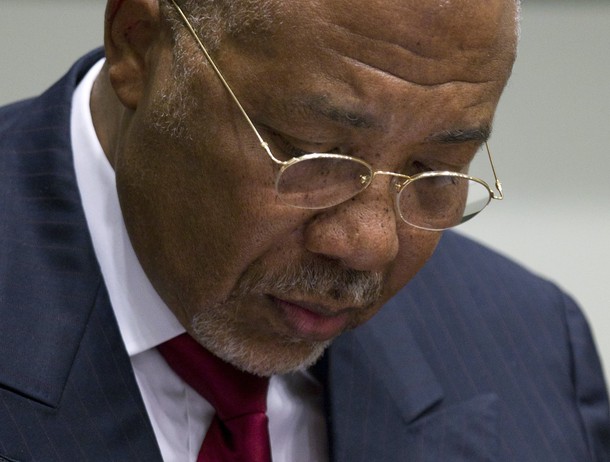The verdict delivered Thursday against Charles G. Taylor for crimes against humanity ends a saga that began on Christmas Eve 1989, when Mr. Taylor and a group of Libyan-trained followers invaded Liberia, igniting a regional conflagration that eventually engulfed parts of Sierra Leone, Guinea and Ivory Coast.
Although Mr. Taylor’s conviction, by a special tribunal in The Hague, will prevent him from endangering the security of West Africa again, the trial — with its limited scope — didn’t even begin to address the devastating damage Mr. Taylor did to his country. Though it is just, the conviction, with sentencing next month, demonstrates the severe limitations of an international justice system that is insufficient to deter future atrocities.
Just as Al Capone was convicted on charges of tax evasion in 1931, Mr. Taylor was ultimately not judged for the wanton destruction he unleashed. Rather than facing charges for crimes committed during the civil war he started in Liberia or his dictatorial rule once he became president, he was tried on narrow grounds relating to atrocities committed by the rebels he backed in neighboring Sierra Leone. And the court found Mr. Taylor guilty only of “aiding and abetting” those crimes, not ordering them.
In Liberia, Mr. Taylor and his allies gained control over nearly 90 percent of the country within months of invading; only a timely military intervention by the country’s neighbors prevented him from achieving total victory. In order to finance a prolonged war, Mr. Taylor conspired with Foday Sankoh, a fellow alumnus of Col. Muammar el-Qaddafi’s Libyan training camps for African revolutionaries, to instigate a rebellion in Sierra Leone that would let them seize control of its fabled diamond fields. Mr. Sankoh’s Revolutionary United Front carried out a terror campaign, chopping off voters’ hands, raping women, cannibalizing captured enemy troops and forcing children to kill their parents and then drafting them as child soldiers.
In Liberia, Mr. Taylor fought a brutal campaign against West African peacekeepers and other armed factions. As many as 250,000 Liberians out of a prewar population of just over three million lost their lives, while more than one million others became refugees — crimes for which no one has yet been held accountable. An internationally brokered peace deal in 1997 led to the travesty of a frightened population’s electing Mr. Taylor president for fear of what would happen if he did not get his way. He was driven from power only in 2003.
Mr. Taylor’s arrest and trial has been hailed as a great stride against impunity, but we must not laud it too much, when many of his closest former associates remain at large and active in public life, for want of a tribunal to take them on. Mr. Taylor’s ex-wife, Jewel Howard Taylor, who filed for divorce after his fall from power in part to protect her assets from international sanctions, is a member of the Liberian Senate. So is Prince Y. Johnson, a onetime Taylor ally who literally butchered President Samuel K. Doe at the start of the civil war and was so certain of his impunity that he had the entire episode videotaped for posterity. Far from becoming a pariah, Mr. Johnson played kingmaker in Liberia’s presidential election last year, delivering the bloc of votes that assured President Ellen Johnson Sirleaf a second term.
Mr. Taylor’s trial went on for so long — for six years after his arrest and nine since the original indictment — that a number of his accused co-conspirators died before any court could judge them. Mr. Sankoh died in 2003 while awaiting trial, and Colonel Qaddafi (an “unindicted co-conspirator”) met a rougher justice at the hands of Libyan rebels last year.
Given the limited verdict, on a reduced set of charges long after the crimes, supporters of international tribunals must ask themselves if there is not a more effective way to achieve justice for the victims of war crimes. While it is important to convict and imprison those most responsible for atrocities, Mr. Taylor’s brutal allies were allowed to escape because the bulk of judicial resources and political will were spent pursuing him.
The conviction will put one of the late 20th century’s nastier characters away where he belongs. But it will be worth celebrating only if it prompts the international community to develop a system that delivers justice to victims more quickly and punishes all war criminals, not just the most notorious ones.
Dr. J. Peter Pham is the director of the Michael S. Ansari Africa Center and the author of “Liberia: Portrait of a Failed State.” This piece first appeared on The New York Times.
Image: ctaylor.jpg
